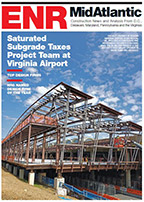House Passes Four-Year Aviation Bill, Hiking Airport Grants
The House has approved a four-year aviation bill that includes a gradual, but substantial, boost for airport construction grants. The measure, which would succeed AIR-21--the Wendell H. Ford Aviation and Investment Reform Act of 2000--was passed on June 11 by a 418-8 vote.
For construction, the key element of the House bill, titled "Flight 100" to commemorate this year's 100th anniversary of the Wright Brothers' flight, is its funding for the Federal Aviation Administration's Airport Improvement Program, which finances construction grants. The bill gradually raises AIP to $4 billion in fiscal 2007, compared with this year's appropriation of $3.38 billion.
The bill's AIP funding starts at $3.4 billion in fiscal 2004, climbing to $3.6 billion in 2005 and $3.8 billion in 2006 before topping out at $4 billion the following year.
The focus now moves to the Senate, where floor debate has begun on a three-year bill approved earlier by the Commerce, Science and Transportation Committee. A vote could come as early as the evening of June 12. The Senate version is less generous to AIP than the House bill, hiking the program to $3.6 billion in its final year.
The White House issued a statement supporting the House measure, saying it extends FAA programs for four years "without increasing taxes or fees on an industry that has been severely impacted by the attacks on September 11, 2001."
But the administration also said it strongly opposes a bill provision that bars FAA from shifting air traffic activities to the private sector and another that requires binding arbitration to settle a dispute between FAA and air traffic controllers.
The statement also indicates that the White House wants to see the funding levels match the lower numbers it proposed. The administration bill recommended holding AIP at $3.4 billion for three years.

